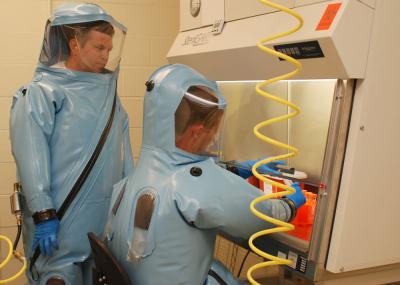Alan Schmaljohn, Ph.D., Professor of Microbiology and Immunology at the University of Maryland School of Medicine (UM SOM), has spent decades studying the Ebola virus and similar viruses identifying key characteristics that have aided in the development of vaccines, antivirals and treatment methods.
As a leader of research and Chief in the Viral Pathogenesis and Immunology Branch with the U.S. Army Medical Research Institute of Infectious Diseases (USAMRIID), Dr. Schmaljohn was able to help identify three of the key antibodies that are used currently in combination with each other to treat patients infected with Ebola.
Dr. Schmaljohn is now one of the scientific leaders in the UM SOM partnership with Department of Defense contract recipient Paragon Bioservices in the manufacture of an Ebola virus vaccine for initial safety testing in humans.
“Several vaccine candidates for Ebolavirus are proceeding through initial manufacture toward safety testing in human volunteers,” Dr. Schmaljohn said. “Different vaccine candidates are based upon different ‘platforms’ in which selected viral proteins may be made ‘in the test tube’ and purified for injection, or may be added genetically as passengers of a different variety of virus that is weakened. Only human trials will provide the final answers as to which vaccines are best on the basis of many criteria, foremost being safety and efficacy,” he said.
Dr. Schmaljohn was originally one of the leaders in determining what kinds of immune responses are required for protection against viruses like Ebola and he was part of the team that first identified antibodies capable of protecting certain animals from Ebola virus. “Subsequently,” he said, “three of these antibodies have been developed as a candidate mixture for human therapy against Ebolavirus, which seems to be true with an American who was infected with Ebolavirus during the current outbreak.” However, he cautions that many scientific questions remain unanswered.
“We are grateful to have scientists at the UM SOM like Dr. Schmaljohn who have studied viruses like Ebola for decades. We can now build on that knowledge and understanding to focus on bridging the science to the development of new vaccines,” said E. Albert Reece, M.D., Ph.D., M.B.A., Vice President of Medical Affairs at the University of Maryland and the John Z. and Akiko K. Bowers Distinguished Professor and Dean of the UM SOM. “The University of Maryland School of Medicine is well-positioned to play an integral role in addressing this serious public health issue.”
The UM SOM has been an international leader in both vaccine development and study of infectious disease for many years with longstanding support from NIH and other federal agencies.
Source: University of Maryland School of Medicine, adapted.


